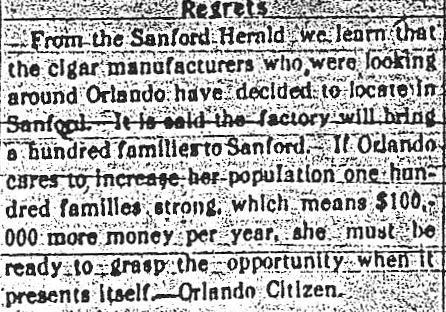Regrets
Dublin Core
Title
Regrets
Alternative Title
Regrets
Subject
Sanford (Fla.)
Cigar industry--Florida
Cigar bands and labels--United States
Orlando (Fla.)
Cigars
Factories--United States
Description
Newspaper quotation from an Orlando citizen about new that a cigar manufacturer would be bringing one hundred families to Sanford, Florida. This item demonstrates that rivalry between businessmen and politicians of Sanford and Orlando. This rivalry began in 1875 when Henry Shelton Sanford, the founder of Sanford, offered free land for an Orange County courthouse on the condition that the county seat be moved to his town. Sanford was outbid by Orlando cattleman Jacob Summerlin, who lent the county $10,000 to keep the courthouse in his city. The rivalry culminated in the northern part of Orange County creating its own county, Seminole County, with Sanford as its county seat.
The cigar industry was first brought to Florida by Cuban immigrants in the 1830s and became one of the most important industries in the Southeast by the last quarter of the 19th century, with Tampa serving as the cigar manufacturing center in the state. In the late 1800s, cigar factories began to appear in various other Florida cities, such as Jacksonville and Tallahassee. Cigar manufacturing first appeared in Sanford sometime between 1909 and 1912. The Florida cigar industry came to its peak in the first quarter of the 20th century, but then declined during the Great Depression and World War II, due to the accumulation of labor union conflicts over the years, the mechanization of production, and changing consumer demands. The industry was revitalized during the 1950s as production soared, despite the decline of the number of workers. Following the Cuban Revolution of the late 1950s and the U.S. embargo on Cuban products in 1962, the Florida cigar industry again declined. The Cuban embargo included tobacco, thus forcing American cigar rollers to begin using Dominican tobacco.
The cigar industry was first brought to Florida by Cuban immigrants in the 1830s and became one of the most important industries in the Southeast by the last quarter of the 19th century, with Tampa serving as the cigar manufacturing center in the state. In the late 1800s, cigar factories began to appear in various other Florida cities, such as Jacksonville and Tallahassee. Cigar manufacturing first appeared in Sanford sometime between 1909 and 1912. The Florida cigar industry came to its peak in the first quarter of the 20th century, but then declined during the Great Depression and World War II, due to the accumulation of labor union conflicts over the years, the mechanization of production, and changing consumer demands. The industry was revitalized during the 1950s as production soared, despite the decline of the number of workers. Following the Cuban Revolution of the late 1950s and the U.S. embargo on Cuban products in 1962, the Florida cigar industry again declined. The Cuban embargo included tobacco, thus forcing American cigar rollers to begin using Dominican tobacco.
Source
Photocopy of original newspaper article: "Another Cigar Factory." The Sanford Herald, October 7, 1910: Cigars Collection, Museum of Seminole County History, Sanford, Florida.
Publisher
Date Created
1910-10-07
Has Format
Original newspaper article: "Another Cigar Factory." The Sanford Herald, October 7, 1910.
Is Format Of
Digital reproduction of photocopied newspaper article: "Another Cigar Factory." The Sanford Herald, October 7, 1910.
Is Part Of
The Sanford Herald, October 7, 1910.
Cigars Collection, Museum of Seminole County History, Sanford, Florida.
Sanford Cigar Collection, Sanford Collection, Seminole County Collection, RICHES of Central Florida.
Format
image/jpg
Extent
63 KB
Medium
1 newspaper article
Language
eng
Type
Text
Coverage
Sanford, Florida
Orlando, Florida
Accrual Method
Donation
Mediator
History Teacher
Economics Teacher
Geography Teacher
Provenance
Originally published by The Sanford Herald.
Rights Holder
Copyright to this resource is held by the The Sanford Herald and is provided here by RICHES of Central Florida for educational purposes only.
Curator
Cepero, Laura
Digital Collection
Source Repository
External Reference
Menocal, Narciso. Cuban Cigar Labels: The Tobacco Industry in Cuba and Florida: Its Golden Age in Lithography and Architecture. Coral Gables, FL: Cuban National Heritage, 1995.
"Cigar Making in Florida." Florida Memory, Division of Library & Information Services. http://www.floridamemory.com/onlineclassroom/cigar-industry/photos/.
"Florida Cigars: Artistry, Labor, and Politics in Florida's Oldest Industry." Florida Memory, Division of Library & Information Services. http://www.floridamemory.com/photographiccollection/photo_exhibits/cigar/.
Peeples, Vernon. "Shifting from Cuba, Cigar Industry reached from Key West to Tampa." The Herald-Tribune, August 22, 2002. http://www.heraldtribune.com/article/20020822/COLUMNIST63/208220355.
Robison, Jim. "Sanford's Busy Cigar-Making Business Flourished in 1920." The Orlando Sentinel, January 19, 1997.
Rajtar, Steve. A Guide to Historic Tampa Florida. Charleston, SC: History Press, 2007.
Transcript
Regrets
From the Sanford Herald we learn that the cigar manufacturers who were looking around Orlando have decided to locate in Sanford. It is said the factory will bring a hundred families to Sanford. If Orlando cares to increase her population one hundred families strong, which means $100,000 more money per year, she must be ready to grasp the opportunity when it presents itself.
----Orlando Citizen.
From the Sanford Herald we learn that the cigar manufacturers who were looking around Orlando have decided to locate in Sanford. It is said the factory will bring a hundred families to Sanford. If Orlando cares to increase her population one hundred families strong, which means $100,000 more money per year, she must be ready to grasp the opportunity when it presents itself.
----Orlando Citizen.
Document Item Type Metadata
Original Format
1 newspaper article
Collection
Citation
“Regrets,” RICHES, accessed February 24, 2026, https://richesmi.cah.ucf.edu/omeka/items/show/1965.
